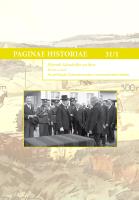T. G. Masarik i razvitije social'noj sfery v Zakarpat'e v period Čechoslovackoj respubliki
T.G. Masaryk and the Development of Social Politics in Zakarpatska Oblast during the Czechoslovak Republic
Author(s): Oleksandr KravčukSubject(s): History, Political history, Interwar Period (1920 - 1939)
Published by: Národní archiv
Keywords: social policy; social care; health care; physical education; Czechoslovak presidents
Summary/Abstract: The article deals with the agenda of the Czechoslovak offices in Zakarpatska Oblast during the interwar period in the spheres of healthcare, social politics, and the support of physical culture and sports organisations. The Czechoslovak politics in the region were implemented by the programme of humane democracy of President T.G. Masaryk who in the formation of a European democratic state took into account the economic and social components and who favoured the concept of a social-oriented market economy. The implementation of this programme under T.G. Masaryk’s presidency during 1919–1935 resulted in intensified modernisation in Zakarpatska Oblast. Although the full implementation of the political form of modernisation was incomplete – autonomy was postponed, and the region’s population experienced life in democratic political culture. In economics, the modernisation created conditions for the transition from feudal relationships to market ones. T.G. Masaryk and the Czechoslovak authorities paid substantial attention to the social issues in the region, especially to the formation of a new educational system and the development of healthcare (management reorganisation in the entire area, building new hospitals, fighting epidemics, improving medical care for the inhabitants); moreover, social care measures were adopted and the development of physical culture and sports were supported. T.G. Masaryk provided material help to the educational institutions in Zakarpatska Oblast, and national-cultural associations provided financial support to students from the region. Humanitarian organisations, primarily the Czechoslovak Red Cross contributed to the social development. Demographic indicators of the region provide evidence of the positive effect of these political measures.Future-oriented reforms gradually improved the economic and cultural situation in the region, the standard of living for the inhabitants, and contributed to the development of the towns and infrastructure in the region. The success did not overcome all of the problems of the primarily agrarian Zakarpatska Oblast. The reason behind this was a difficult social background, the destructive effect of the Great Depression, and the consequences of the foreign political events from 1938–1939 that disrupted the solution of many problems of the region in the short period of Czechoslovak democracy. Despite the incomplete modernisation of Zakarpatska Oblast, the years of T.G. Masaryk’s presidency were distinguished by many significant deeds for the regions.
Journal: Paginae Historiae
- Issue Year: 31/2023
- Issue No: 1
- Page Range: 234-260
- Page Count: 27
- Language: Russian

